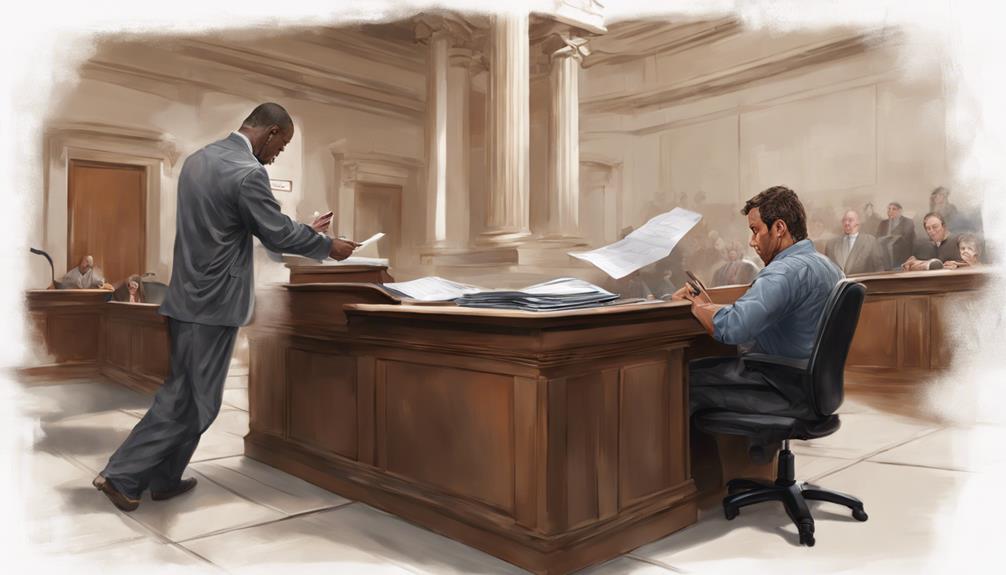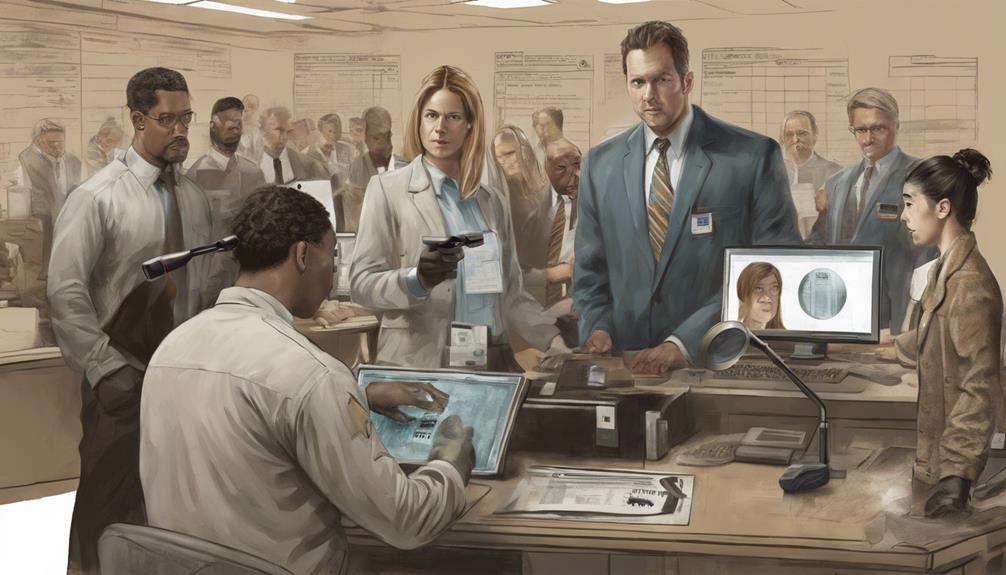Restraining orders typically don't show on regular background checks but might surface in more extensive searches. This could impact job possibilities and call for legal assistance.
Key Takeaways
- Restraining orders may not show on standard background checks.
- Thorough searches can reveal active or expired restraining orders.
- Detailed background checks by employers may uncover restraining orders.
- Legal counsel can assist in managing the impact of restraining orders on employment.
- Violating restraining orders can result in legal consequences and appear on background checks.
Protective Orders Vs. Restraining Orders

Protective orders primarily serve to safeguard individuals from abuse in domestic violence situations, whereas restraining orders are legal measures typically utilized in civil court cases. While protective orders are aimed at preventing harm in cases of domestic violence, restraining orders are broader and can cover various situations such as harassment, stalking, or assault.
When considering the impact of a restraining order on a background check, it's pivotal to understand the differences in their scope and application.
Restraining orders appear on background checks when they're filed in civil court cases. These orders restrict contact with specific individuals or their families, aiming to provide a layer of protection against potential harm. On the other hand, protective orders, especially in cases of domestic violence, require a thorough background check to determine the necessity of such an order.
Violating either type of order can have serious consequences, affecting one's freedom of movement, communication, and even relationships with children. Understanding the nuances between protective and restraining orders is essential when considering their implications on background checks and personal safety.
Obtaining a Protective Order
How can individuals in Texas initiate the process of obtaining a protective order?
In Texas, individuals seeking a protective order must provide proof of family violence. This evidence can include photos, medical records, and witness testimonies.
It's recommended to apply for the protective order immediately after an incident and to keep detailed records of any abuse.
In cases involving stalking, sexual assault, or human trafficking, proof of abuse is essential in obtaining a protective order.
Protective orders are primarily designed to protect individuals from domestic violence and can be either temporary or permanent depending on the circumstances.
Ensuring that the necessary documentation and evidence are in place is vital for a successful application for a protective order in Texas.
Consequences of Having a Protection Order

The issuance of a protection order can result in various restrictions and consequences for the individual involved. These consequences may include limited access to certain areas, such as the home or workplace, as well as constraints on communication with children or other family members. Employment can also be significantly impacted, particularly if the protection order prohibits the possession of firearms, which can affect certain job roles.
Law enforcement plays an important role in enforcing protection orders, ensuring that the restrictions are adhered to. Violating a protection order can lead to serious legal repercussions, including criminal charges.
It's essential for individuals subject to protection orders to understand the implications fully, as these orders can have lasting effects on their daily lives and interactions. Managing these restrictions effectively requires awareness of the boundaries set by the protection order and compliance with the legal requirements to avoid potential violations.
Background Checks and Orders
Background checks play a vital role in revealing information about an individual's past, including any history of restraining orders. These orders, although not always visible on general background checks, can have a substantial impact on the outcome of more detailed criminal background screenings.
It's essential for individuals to understand the potential visibility and implications of restraining orders on their background checks.
Restraining Orders Visibility
Restraining orders mightn't always be immediately visible on standard criminal background checks. While these orders are typically not included in regular background screenings, they may still be accessible through searches of state or county court records. Individuals should be mindful that some states allow for the expungement of records related to prior restraining orders, which could impact their visibility on background checks.
Additionally, background checks have the potential to reveal both active and expired orders that were issued against an individual in the past. It's crucial to emphasize that thorough background checks often involve detailed inspections of court records to establish a more complete picture of an individual's history.
- Restraining orders can be found in state or county court records.
- Some states provide the option to expunge records of past restraining orders.
- Background checks can uncover both active and expired restraining orders.
Impact on Background Checks
Understanding the potential impact of restraining orders on background checks involves recognizing that these orders may not be readily visible on standard screenings but can be uncovered through more thorough investigations or specific court record searches.
Employers conducting extensive background checks may come across active or expired restraining orders in an individual's history, as these orders are part of the public record accessible through court databases. This inclusion in public records means that restraining orders have the potential to influence background checks, shedding light on an individual's past interactions with the legal system.
Individuals dealing with background checks for employment or housing should be aware of how a restraining order might factor into the process, as transparently disclosing this information can preempt misunderstandings and negative assumptions. Being forthright about a restraining order can demonstrate accountability and honesty, potentially mitigating any concerns that may arise during the background check process.
Legal Assistance and Employment Impact

Hiring an attorney to challenge a restraining order can greatly impact one's life. Understanding the legal implications of such orders is vital in maneuvering potential consequences for employment.
It's essential to take into account how protection orders may impact background checks and ongoing job opportunities.
Legal Implications of Orders
Securing legal assistance when facing a restraining order is vital for managing its potential impact on employment opportunities. When dealing with legal implications of court orders like restraining orders, individuals should consider the following:
- Hiring an attorney: Obtaining legal representation can help contest the restraining order effectively and mitigate its effects on future employment prospects.
- Understanding background checks: Some employers conduct thorough background checks, including looking into criminal records, which may reveal the presence of a restraining order.
- Seeking clarity on employment impact: It's essential to comprehend how a restraining order could influence ongoing or future employment, as employers hold the discretion to assess its relevance to the job position.
Employment Considerations After Orders
When facing a restraining order, individuals should seek legal counsel to navigate the potential impact on their employment status, especially in relation to background checks conducted by employers.
While protection orders generally don't directly affect ongoing employment, some employers, particularly those hiring for high-level clearance positions, may conduct thorough background checks. In Texas, companies can review up to 7 years of criminal records during these checks, with exceptions for specific industries requiring longer periods.
Seeking legal assistance can be vital in understanding the employment considerations stemming from a restraining order's presence on background checks. Employers hold the discretion to interpret the significance of a restraining order on employment decisions, underscoring the value of legal guidance in these situations.
Impact on Background Checks
Legal assistance can play an essential role in mitigating the negative impact of restraining orders on background checks for housing and employment opportunities. Seeking legal guidance can help individuals understand their rights and options when dealing with restraining orders, potentially minimizing the repercussions on their background check results.
Additionally, legal professionals can assist in properly disclosing information about restraining orders, ensuring transparency and clarity during the application process.
Understanding the Legal Implications: Legal assistance can provide clarity on how restraining orders may affect background checks, empowering individuals to make informed decisions.
Navigating Disclosure Requirements: Lawyers can help individuals navigate the disclosure requirements related to restraining orders when applying for housing or jobs.
Minimizing Negative Consequences: Legal support can aid in mitigating the impact of restraining orders on background checks, potentially improving housing and employment prospects.
Understanding Restraining Orders
Understanding restraining orders involves recognizing them as civil court orders designed to protect individuals from potential harm.
These court orders, including restraining orders, are part of public records accessible through state or county court databases. While they may not always appear on standard criminal background checks, more detailed or specific background checks can reveal the presence of a restraining order.
Due to their public record status, restraining orders can be visible on thorough background checks. It's essential for individuals to be aware of the implications of having a restraining order issued against them, as being forthright about this information can help avoid misunderstandings or negative assumptions.
Visibility of Restraining Orders

Restraining orders, although not typically present on standard criminal background checks, may become visible in searches of state or county court records. When background checks are conducted, there's a possibility that a court order for a restraining order will appear, as these matters are considered a civil issue rather than a criminal one.
Here are some key points related to the visibility of restraining orders:
- Court records: Orders of protection issued by the court are part of public records and may be accessible in searches.
- Expungement options: Some states offer individuals the opportunity to expunge records of prior restraining orders, which could impact their visibility in background checks.
- Active or expired orders: Background checks may reveal both active and expired restraining orders in an individual's history, providing a detailed view of their past interactions with the legal system.
Employer Considerations
Employers should take into account the presence of court order records in background checks when evaluating job applicants. When considering candidates with a restraining order filed against them, employers must navigate this sensitive issue with caution and in compliance with the Fair Credit Reporting Acts. It is essential for employers to obtain the individual's consent before accessing court order records for background checks. Ongoing monitoring becomes crucial in maintaining a safe workplace environment, especially when dealing with restraining orders. Employers conducting pre-employment background checks may come across records of past violations related to restraining orders. Ultimately, employers hold the discretion to assess the impact of a restraining order on employment based on the unique circumstances of each case.
| Employer Considerations |
|---|
| Obtain individual's consent |
| Compliance with Fair Credit Reporting Acts |
| Ongoing monitoring for workplace safety |
| Assess impact of restraining orders |
| Discretion in evaluating candidates |
Consequences of Violating Restraining Orders

Violating a restraining order can result in serious consequences, including arrest, fines, and potential imprisonment. These charges can show up on background checks, affecting one's criminal record and future prospects.
It's essential to understand the impact of such violations, as they can have long-lasting ramifications on an individual's life.
Violation Consequences Overview
Breaking a restraining order can result in severe legal repercussions, including arrest, fines, and potential imprisonment, impacting one's criminal record and future opportunities. Violating a restraining order can lead to charges that may appear on background checks, affecting employment and housing prospects.
In addition, individuals breaking restraining orders may face contempt of court charges, further complicating their legal situation. Employers often scrutinize the origin of contempt charges related to restraining order violations to gain a thorough understanding of a candidate's background.
Understanding the potential consequences of violating a restraining order is essential for individuals subject to such orders.
- Violating a restraining order can lead to arrest, fines, and potential prison time.
- Charges for violating a restraining order may appear on background checks.
- Contempt of court charges may be applied to individuals breaking restraining orders.
Criminal Charges Impact
Individuals who violate restraining orders may face significant criminal charges that can have lasting impacts on their records and legal standing. Violating a restraining order can result in criminal charges appearing on background checks, potentially leading to severe penalties like fines and imprisonment. These charges, whether misdemeanors or felonies, can have a detrimental effect on one's criminal record.
The consequences are even more severe when violations are linked to domestic violence incidents, further tarnishing the individual's legal standing. Additionally, failing to adhere to firearm prohibitions outlined in a restraining order can escalate the situation, potentially resulting in additional criminal charges.
It's vital for individuals to understand the gravity of violating restraining orders, as the ramifications can extend beyond immediate penalties to long-term repercussions on their criminal records and overall legal status.
Long-Term Record Ramifications
The long-term impacts of breaching restraining orders can have a lasting effect on an individual's criminal record and future opportunities. Breaching a restraining order can lead to criminal charges that show up on background checks, potentially impacting job prospects and other opportunities. The consequences of such violations go beyond immediate penalties and may shape an individual's future in significant ways.
- Criminal Record Ramifications:
Violations of restraining orders can result in misdemeanor or felony charges, creating a permanent mark on one's criminal record.
- Career Restrictions:
Background checks revealing restraining order breaches can impede job prospects, especially in fields that require clean records.
- Social Stigma:
Individuals who breach restraining orders may encounter societal judgment and reputational harm that can persist long after the incident.
It is essential for individuals to comprehend the seriousness of breaching restraining orders and the lasting consequences it can have on their lives.
Ethical and Legal Considerations
Employers must carefully navigate ethical and legal considerations when evaluating candidates with restraining orders during background checks. It is crucial for companies to avoid discriminatory practices while also ensuring they do not engage in legally perilous scenarios when hiring individuals with restraining orders. One way to approach this is by accepting applicants under orders with conditions, provided they honor the terms. However, it is essential to consider the potential risks an individual with a restraining order may pose, especially in roles where job duties could lead to violations of the order.
| Ethical Considerations | Legal Considerations |
|---|---|
| Avoiding discrimination practices | Ensuring compliance with employment laws |
| Providing fair opportunities | Protecting the rights of individuals with restraining orders |
| Evaluating risks fairly | Following proper procedures during background checks |
| Maintaining confidentiality | Understanding the implications of hiring individuals with restraining orders |
Frequently Asked Questions
How Long Does a Restraining Order Stay on Your Record in California?
A restraining order in California can stay on a person's record for up to 5 years, with the possibility of renewal or extension. Violating such an order can lead to criminal charges and long-term implications on one's record.
Does a Restraining Order Show up on a Background Check in California?
In California, the visibility of a restraining order on background checks varies. Transparency upfront can prevent misunderstandings. Court databases might contain such records. Detailed checks may include this info. Being informed is key.
Do Restraining Orders Show up on Background Checks in Florida?
In Florida, restraining orders can appear on background checks as part of public records. Employers in Florida conducting thorough background checks may encounter active or expired restraining orders, underscoring the significance of understanding their implications for employment opportunities.
Does a Restraining Order Show on a Background Check in Illinois?
In Illinois, a restraining order may or may not appear on a background check, depending on the depth of the search. Employers conducting thorough checks could uncover such orders. Transparency can avert misconceptions.
Conclusion
As individuals navigate the complexities of protective orders and restraining orders, one question remains: do restraining orders appear on background checks?
The impact of these legal measures on employment opportunities and personal safety is significant. With potential consequences for violating orders and ethical considerations to ponder, the visibility of restraining orders can have lasting effects on individuals' lives.
The implications of these legal matters aren't to be taken lightly, leaving many wondering about the long-term repercussions.









